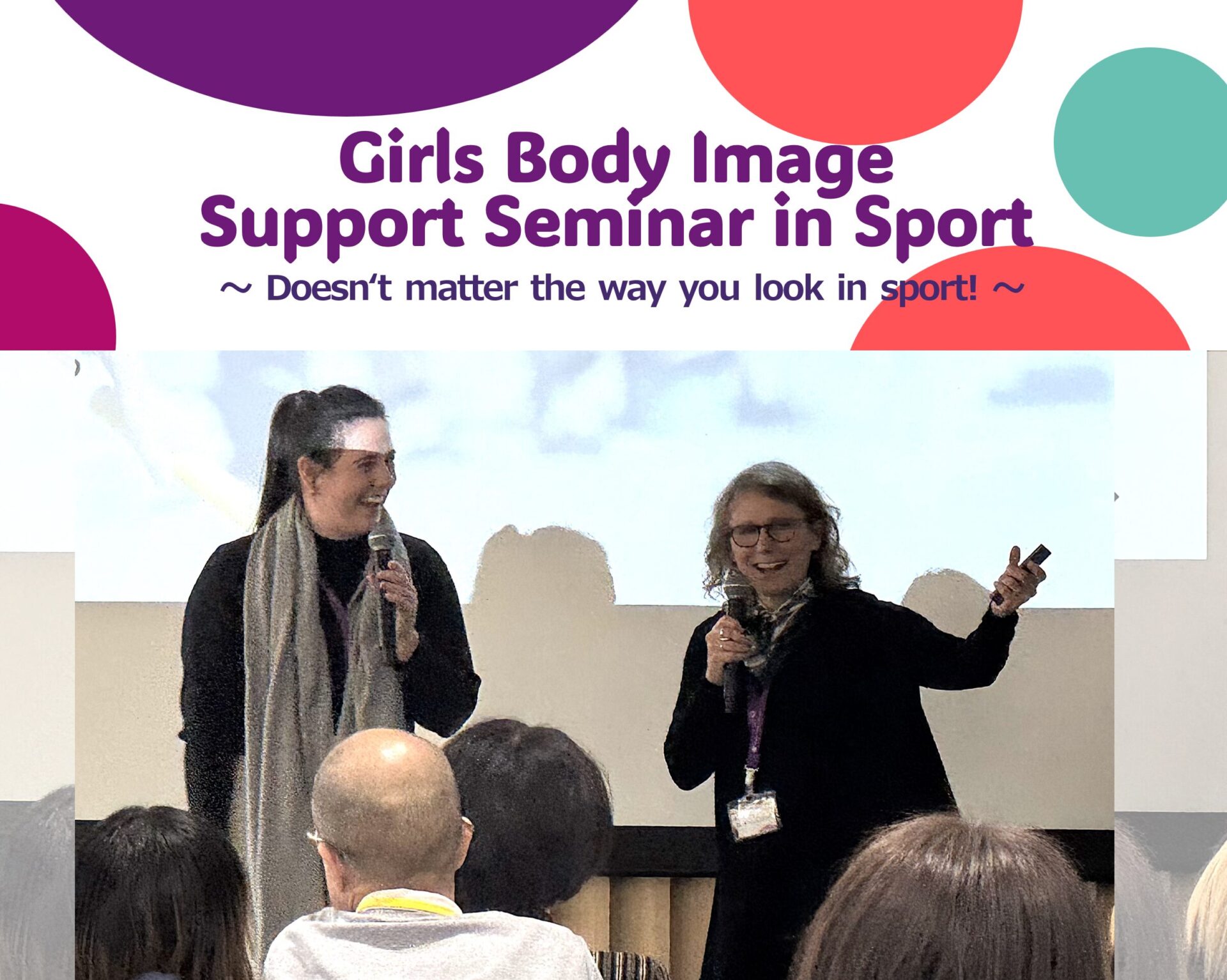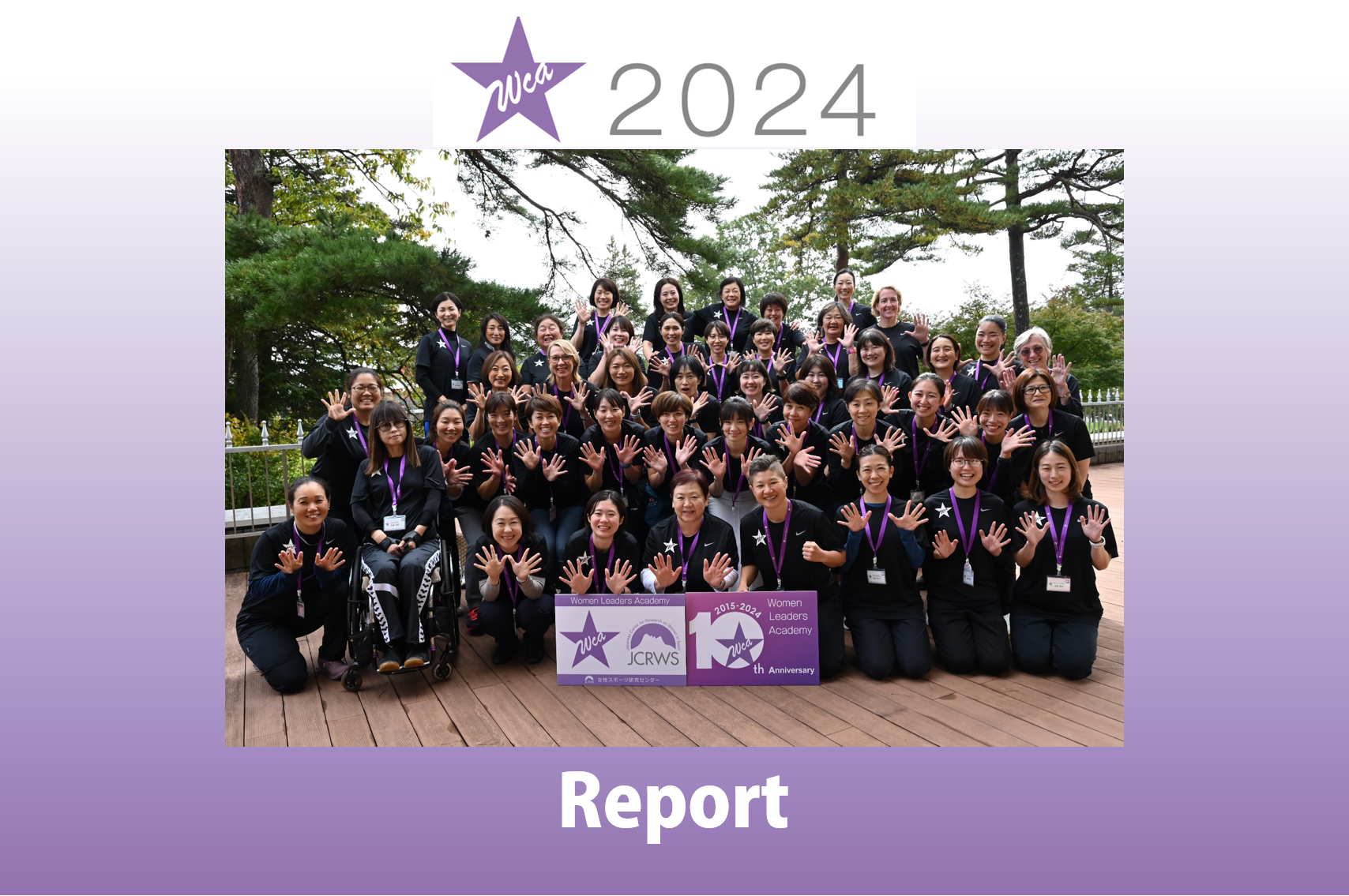Follow-up to the Thai Government Action Plan
Follow-up for Young Women’s Leadership in Thailand
Workshop implementation report
It was determined in November 2022 that one of the projects, follow-up workshops to be held in 10 ASEAN countries, will first be held in Thailand. With the cooperation of the Government of Thailand, the chair country of the ASEAN-Japan Ministerial Conference on Sports, two follow-up workshops were held in Bangkok from January 29 to February 1, 2023, to review the progress of the Action Plan set at the time of the “ASEAN-Japan Workshop on Promoting Gender Equality in Sports” in 2021 and to promote gender equality through sports.
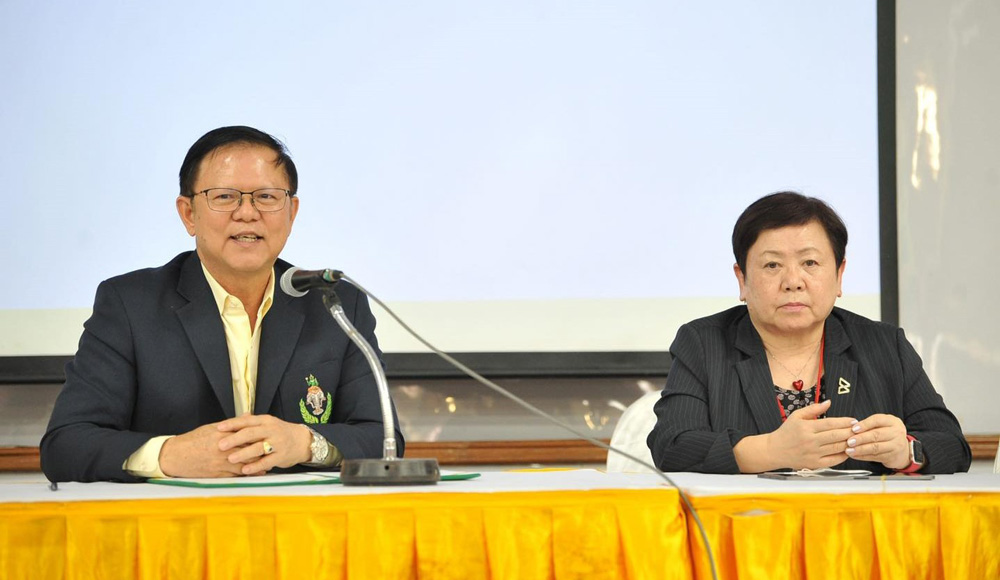 Dr. Niwat Limsuknirun, Dr. Etsuko Ogasawara (from left)
Dr. Niwat Limsuknirun, Dr. Etsuko Ogasawara (from left)©Public Relation Sub-Division, Department of Physical Education of Thailand
Follow-up to the Thai Government Action Plan
“Workshop for Sports Organizations/Entities Personnel” report 【Day1】
The “Workshop for Sports Organizations/Entities Personnel” is designed for men and women involved in sports for all, sports promotion and development, school sports, and sports media, opened with remarks by Dr. Niwat Limsuknirun, Director of the Department of Physical Education, Ministry of Tourism and Sports, Thailand and Dr. Etsuko Ogasawara, Director of the Japanese Center for Research on Women in Sport, Juntendo University, the organizer of this workshop. Dr. Ogasawara thanked the organizers for making the workshop possible, saying “I hope the workshop will be a meaningful opportunity to deepen understanding of gender equality through sports”.
The first speaker, Ms. Aya Noguchi, Assistant Professor at Faculty of Health and Sports Science, Juntendo University, provided recollections of “ASEAN-JAPAN Workshop on Promoting Gender Equality in Sports” that was held online in 2021. She explained that the Japanese government plans to follow up on the Action Plan and provide leadership training over the next five years and that Thailand is the first country to do so.
Dr. Rieko Yamaguchi, Professor at Faculty of Business Administration, Josai University, spoke on the subject “Gender Issues in Sports”. She illustrated by referring to recent news and her own experiences to show that there is still deep-rooted gender discrimination in society, and explained the importance of not only improving the status of women, but also considering issues in men themselves and between men, as well as the generation gap, in order to achieve gender equality.
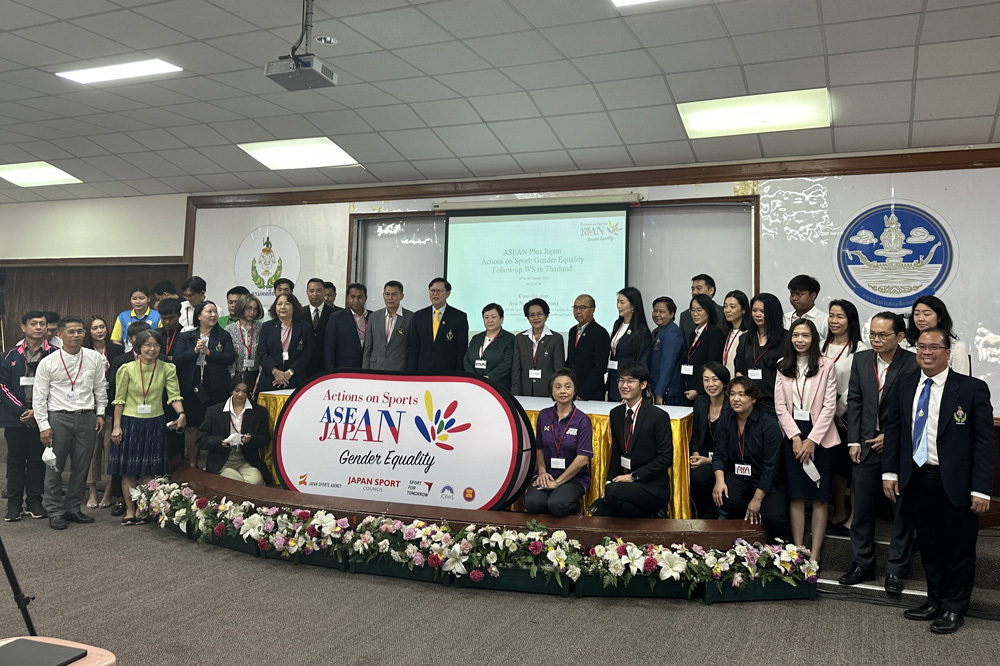
Dr. Niwat presented on the subject of “Discussions on Gender Issues in Thailand”. Then, Ms. Miki Morimoto, a director at Nike, a major sports manufacturer, took the podium on the topic “Why don’t girls do sports?” In the second half of the session, the participants moved outside the venue to think about the reasons why Thai girls do not play sports in a group discussion format and presented their ideas.
At the end of the first day, Ms. Noguchi gave a lecture on “Safeguarding and Sports”. She explained the importance of safeguarding vulnerable people as an organization to protect them from human rights violations. In the second half of the session, Dr. Yamaguchi took the stage again. She discussed the problem of sexual violence in Japan, including voyeurism, and stressed that in addition to sexual violence itself, the problem of secondary damage to victims is also serious. Finally, Ms. Noguchi concluded the session by saying “In the sports world, victims may not even be aware of the damage. We need to recognize this and ensure that there is a safe and secure environment in the first place”.
Workshop for Sports Organizations/Entities Personnel 【Day2】
The first lecture was by Ms. Noguchi on “Development and Sports (Gender)”. The presentation provided an easy-to-understand overview of how sports as a tool can help with social and gender issues, with examples.
Next, Dr. Yamaguchi gave a lecture on the topic of “Sports and Media”. In Japan, in particular, the media focuses a lot on the appearance of girls and women athletes (whether they are smiling, etc.), and the accompanying problem of skinny women. She also highlighted the problem of the small number of female employees in major newspapers, television, and other media outlets, and the fact that few of them are executives. In the second half, the group discussion was divided into men and women to discuss the media in Thailand. Participants found that there is media bias in Thailand as well, such as broadcasting men’s sports but not women’s. Dr. Yamaguchi said, “I’d like people to think about how to utilize the media to further develop sports in the future”.
Next lecture on “Role Models and Female Athletes”, Ms. Morimoto explained that familiar role models are important for people who play sports, and gave a real-life example of Nike’s emphasis on creating a “her-ness” for individual female athletes. As familiar role models, she introduced children’s center staff members who implement the JUMP-JAM program and athletes who focus on racism protests and LGBTQ awareness activities, explaining the importance of just “being yourself”.
Participants then engaged in group work. Under the title “Next Steps to Promoting Gender Equality in Sports”, the participants discussed in depth the factors contributing to issues that inhibit women’s participation in sports, and discussed ways to resolve these issues. For example, the quality of instructors was cited as a problem for girls’ lack of motivation to exercise. There were many occasions when perspectives unique to sports and government officials were discussed, for example by citing policies and budgets for instructor training as a solution to this issue.
With this, the workshop for came to an end, and Dr. Niwat and Dr. Ogasawara took the stage for closing remarks. Dr. Niwat closed with an acknowledgment, “I have been involved in the sports field for over 30 years and it was great to hear so many opinions, including some I didn’t know. Thank you for choosing Thailand as your first country”.
Follow-up for Young Women’s Leadership in Thailand
“Workshop for Young Women Leaders” report 【Day1】
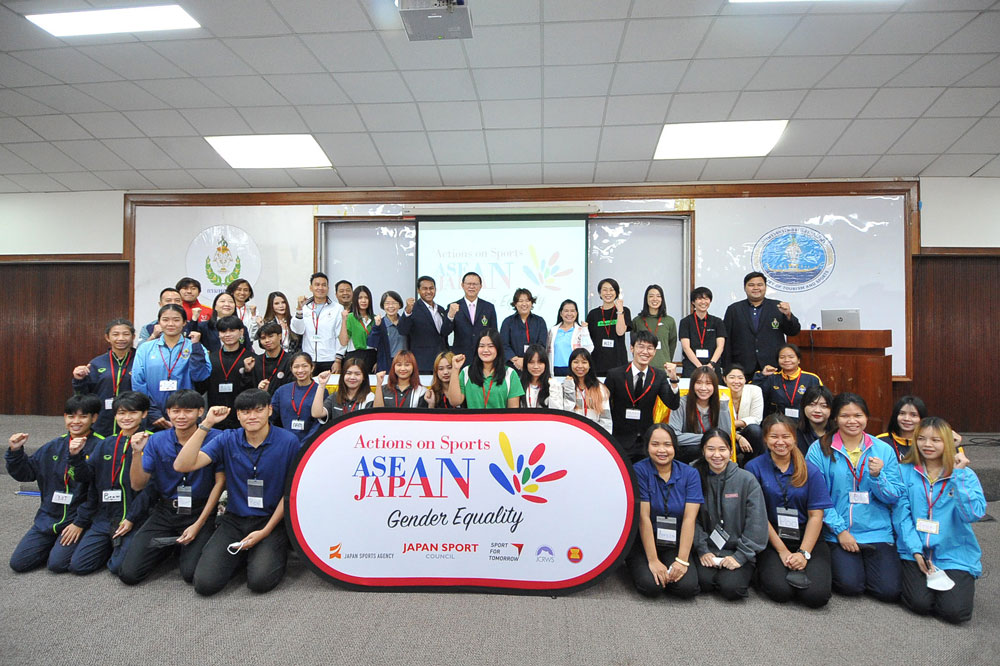 ©Public Relation Sub-Division, Department of Physical Education of Thailand
©Public Relation Sub-Division, Department of Physical Education of Thailand
The “Workshop for Young Women Leaders”, attended by sports leaders between the ages of 13 and 22, was rich in activities throughout.
Ms. Noguchi of Juntendo University and Dr. Niwat Limsuknirun, continuing from the previous day, took the stage to address the audience on the first day. Ms. Noguchi said “At the ASEAN-JAPAN Workshop on Promoting Gender Equality in Sports in 2021, we held a workshop with ASEAN countries. I’d like to thank everyone for their efforts in organizing this follow-up workshop in Thailand”.
The workshop started off with an icebreaker. After the instructors and staff members introduced themselves to the young women leaders, a self-introduction game was played to create a friendly atmosphere.
Ms. Noguchi took the podium first with a presentation titled “Introduction of Empowerment”. She emphasized that “empowerment” is a process by which people in vulnerable positions in society acquire the ability to make choices, and that, for example, in order for women to have social status and authority, social change is also necessary in addition to the improvement of their own abilities. She explained that empowerment begins with taking care of oneself, so it is important to define one’s own purpose and act toward it.
Next, Dr. Yamaguchi gave a lecture themed “Who’s the BOSS of your body?” Citing examples of sexual victimization and secondary victimization in Japan and around the world, she encouraged both men and women to be courageous and speak up if they are victimized. She also sees “girlishness”, which is excessively imposed by society and the media, as a problem. She concluded by stating that the answer to the question posed at the beginning of the lecture is “I am”. In other words, your body is your own and you must protect it.
This was followed by an empowerment activity. Participants moved outdoors, freed from masks, and enjoyed recreational games where they worked together toward a goal and played soccer with their own added rules for everyone to enjoy equally. Ms. Yuiko Inoue, former soccer player and co-director of S.C.P. Japan, a general incorporated association, who was in charge of this session, said, “You can learn the skills needed to make a difference in society through simulated experience in the field of sports”.
The afternoon started again with an icebreaker. The first speaker was Ms. Morimoto titled “Role models”, adapted from the previous day’s “Workshop for Sports Organization/Entitles Personnel”, and was geared toward young women leaders.
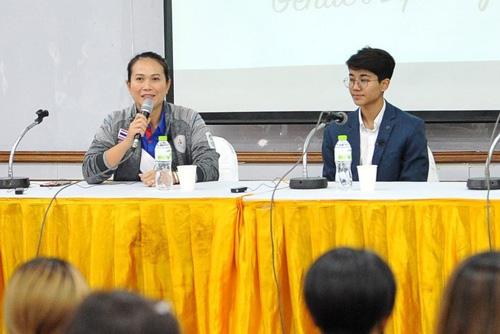 Capt. Pawina Thongsuk、Capt. Chanatip Sonkham (from left)
Capt. Pawina Thongsuk、Capt. Chanatip Sonkham (from left)
This was followed by a talk show by two of Thailand’s leading female athletes, Capt. Pawina Thongsuk and Capt. Chanatip Sonkham. Capt. Pawina began lifting weights at the age of 14 on the advice of her P.E. teacher and won a gold medal at the 2004 Athens Olympics. Since 80% of the competitors were men, she thought she could be a pioneer if she started. Capt. Chanatip started Taekwondo when she was in the first grade of junior high school, when she saw and admired the athletes and won a bronze medal at the 2012 London Olympics. She keeps in touch with the seniors whom she admires even after she retired from the sport.
Both women were adamant that the training environment during their working years was strict and that there were no problems due to sexual abuse or cultural differences with foreign instructors. Regarding her success in competition, Capt. Pawina said that the secret to her success was her love of competition, serious training, and encouragement from her mother and mentors, and she sent a message to the audience to relax and work on their skills without worrying about winning or losing. “Believe in yourself”, Capt. Chanatip said, “Don’t stick to the winners, but explore various pathways. I will always support you”, bringing courage to the participants.
Workshop for Young Women Leaders【Day2】
The second day started with physical activities. Ms. Yuki Shigenami, director of S.C.P. Japan, led the event and created a friendly mood with fun movements using a ball.
In the first lecture, Ms. Inoue took the stage. She presented the topic of safeguarding to the girls in an easy-to-understand manner. Right from the beginning of her lecture, Ms. Inoue carefully explained the importance of rules such as valuing equal relationships and not criticizing others to ensure safety and security. She explained safeguarding in sports, each group considered what dangers there are in the field of sports. The girls who participated shared stories based on their experiences, such as harassment and violence from coaches, and adults favoring only certain individuals or teams. Ms. Inoue urged participants to “talk to someone when you cannot face the situation alone”.
In the afternoon, after exercising to music, Ms. Morimoto led a workshop on “How to Use Your Voice to Change the Society” In the group presentations, all participants made presentations on topics including gender barriers such as differences in size and ability, and solutions such as changing the rules accordingly and creating more sports that men and women can play together. Regarding barriers such as differences in culture and values, solutions found in education, including awareness-raising through influencers and social media, and through holding the workshop itself. The workshop was a valuable opportunity to think about and share what approaches are available to address various barriers. “Make yourself your own ally” Ms. Morimoto concluded, “If we then question the rules and mechanisms, I think we can find solutions”, she encouraged.
This marked the end of the workshop for young women leaders. Each of the lecturers greeted the participants and expressed their impressions and appreciation. Ms. Noguchi and Dr. Niwat took the stage for the closing session. “We also learned a lot about Thailand”, said Ms. Noguchi, concluding the two-day workshop, “We hope you will do your part to help Thai women enjoy sports more”.






